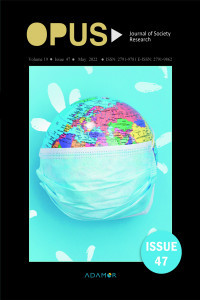Challenging Islamophobia with Humor - The Example of the Datteltäter on Youtube
İslamofobi, Mizah, Yeni Nesil Göçmenler, Datteltäter, YouTube
Challenging Islamophobia with Humor - The Example of the Datteltäter on Youtube
Islamophobia, Humor, New Generation Immigrants, Datteltäter, YouTube,
___
- Aidi, L. (2021). Muslim Stand-Up Comedy in the US and the UK: Incongruity, Everydayness, and Performativity. Religions, 12(10).
- Aydemir, S. (2017). İslamofobi Karşısında Müslümanların Sorumluluğu (Öz Eleştirel Bir Kimlik ve Kişilik Sorgulaması). İlahiyat Akademi Dergisi, pp. 171-181.
- Aydin, Z. (2023). Laughing Matter(s): Reactions of Muslims in Europe to Islamophobia and the Role of Comic Relief. Journal of Muslims in Europe, 12(3), 285–302.
- Berlant, L., & Ngai, S. (2016). Comedy Has Issues. Critical Inquiry, 43(2), 233–249.
- Bhungalia, L. (2019). Laughing at Power: Humor, Transgression, and the Politics of Refusal in Palestine. Environment and Planning C: Politics and Space, 38(3), 387–404.
- Douglas, E. R. (2014). Laughing Matters: Micro-Resistance to Gendered Rationality. Master's of Art Thesis, Department of Philosophy, University of Alberta.
- Evolvi, G. (2017). Hybrid Muslim Identities in Digital Space: The Italian Blog Yalla. Social Compass, 64(2), 220-232.
- Hammad, O. (2020). North American Muslim Satire on YouTube: Combatting or Reinforcing Stereotypes? Journal of Media and Religion, 19(4), 127–144.
- Marzolph, U. (2011). The Muslim Sense of Humor. In H. Geybels & W. Van Herck (Eds.), Humor and Religion: Challenges and Ambiguities (pp. 218–247). London: Continuum.
- Morreall, J. (1997). Gülmeyi Ciddiye Almak. İstanbul: İris Yayıncılık.
- Nussbaum, M. C. (2018). Yeni Dinsel Tahammülsüzlük: Kaygılı Bir Çağda Korku Siyasetinin Üstesinden Gelmek. Ankara: Phoenix Yayınları.
- Wallraf, G. (1985). Ganz Unten. Köln: Verlag Kiepenheuer.
- Yildiz, E. (2021). Das Postmigrantische und das Politische: Eine neue Kartographie des Möglichen. In L. Gensluckner, M. Ralser, O. Thomas-Olalde & E. Yildiz (Eds.), Die Wirklichkeit lesen: Political Literacy und politische Bildung in der Migrationsgesellschaft (pp. 21-42). Bielefeld: transcript Verlag. Books:
- Bakhtin, M. (2001). Karnavaldan Romana, Edebiyat Teorisinden Dil Felsefesine Seçme Yazılar. (Çev. Cem Soydemir). İstanbul: Ayrıntı Yayınları.
- Freud, S. (1996). Espiri Sanatı. (Çev. Erdoğan Alkan). İstanbul: Toplumsal Dönüşüm Yayınları.
- Göle, N. (2015). Gündelik Yaşamda Avrupalı Müslümanlar: Avrupa Kamusal Alanındaki İslam İhtilafları Üzerine Bir Araştırma. İstanbul: Metis Yayınları.
- Kundera, M. (1988). Gülüşün ve Unutuşun Kitabı. (Çev. Aydın Emec). İstanbul: Can Yayınları.
- Said, E. (2008). Medyada İslam: Gazeteciler ve Uzmanlar Dünyaya Bakışımızı Nasıl Belirliyor? (Çev. Aysun Babacan). İstanbul: Metis Yayınları.
- Said, E. (2003). Şarkiyatçılık. (Çev. Berna Ülner). İstanbul: Metis Yayınları.
- Sanders, B. (2001). Kahkanın Zaferi, Yıkıcı Tarih Olarak Gülme. (Çev. Kemal Atakay). İstanbul: Ayrıntı Yayınları. Book Chapters:
- Bilici, Mücahit (2010). Muslim Ethnic Comedy: Inversions of Islamophobia. In A. Shryock (Ed.), Islamophobia/Islamophilia: Beyond The Politics of Friend and Enemy (pp. 195-208). Indiana University Press. Unpublished Theses and Dissertations:
- Batur, M. (2008). Der postkoloniale Andere. Eine kultursoziologische Untersuchung zur Alterität von Muslimen im europäischen Kontext. [Unpublished master's thesis]. University of Vienna.
- Batur, M. (2017). Religion und Gewalt. Genealogie eines konstruierten Zusammenhangs. [Unpublished doctoral dissertation]. University of Vienna. Reports:
- Bekaroğlu, E., Batur, M., Doğan, N., Kalkan, M., & Kucur, F. (2015). Avusturya’da Göç, Azınlıklar ve Siyaset: 2014 Raporu. İstanbul Üniversitesi İktisat Fakültesi, İFESAM. Websites:
- Alyanak, Z. B. (2015). "Datteltäter" – Ein deutsch-muslimisches Empörium. Interview by Katharina Pfannkuch. Retrieved from [WEB Accessed: 09.04.2021] https://www.welt.de/vermischtes/article143863912/Datteltaeter-Ein-deutsch-muslimisches-Empoerium.html
- Alyanak, Y. (2020). Darf man über Rassismus lachen? Interview by Anneta Kuhn. Retrieved from [WEB Accessed: 09.07.2021] https://deutsches-schulportal.de/schule-im-umfeld/datteltaeter-youtube-satire-videos-darf-man-ueber-rassismus-lachen/
- Bouamar, F. (2017). Wir wollen ein Satire-Kalifat. Retrieved from [WEB Accessed: 20.11.2021] https://www.nd-aktuell.de/artikel/1038957.wir-wollen-ein-satire-kalifat.html
- Hafez, K., & Richter, C. (2007). Das Islambild von ARD und ZDF. Retrieved from [WEB Accessed: 10.04.2023] https://www.bpb.de/shop/zeitschriften/apuz/30402/das-islambild-von-ard-und-zdf/
- Hafez, K., & Schmidt, S. (2020). Rassismus und Repräsentation: das Islambild deutscher Medien im Nachrichtenjournalismus und im Film. Retrieved from [WEB Accessed: 10.04.2023] https://www.bpb.de/lernen/bewegtbild-und-politische-bildung/themen-und-hintergruende/314621/rassismus-und-repraesentation-das-islambild-deutscher-medien-im-nachrichtenjournalismus-und-im-film/
- Çiçek, B. Ö. (2015). Müslümanlar için Amerika’da var olma rehberi: Mizah Müslüman’ın yitirilmiş malı mı? Retrieved from [WEB Accessed: 09.11.2021] https://www.lacivertdergi.com/dosya/2015/04/30/muslumanlar-icin-amerikada-var-olma-rehberi-mizah-muslumanin-yitirilmis-mali
- YouTube Videos:
- Datteltäter (2015). Mit ISIS ins Weekend-Feeling... Retrieved from [WEB Accessed: 09.10.2021] https://www.youtube.com/watch?v=ktqFLMjj7ks
- Datteltäter (2016a). MAGIC RAMADAN 2016 -Der Fliegende Teppich. Retrieved from [WEB Accessed: 09.10.2021] https://www.youtube.com/watch?v=IleHUx3e-yU&t=78s
- Datteltäter (2016b). Dinge, die Muslimische Eltern sagen! TEIL 2. Retrieved from [WEB Accessed: 09.10.2021] https://www.youtube.com/watch?v=Qkweg8CvbB4
- Datteltäter (2017). 16 Dinge, die Kopftuchtragende Frauen in Deutschland kennen! Retrieved from [WEB Accessed: 20.10.2021] https://www.youtube.com/watch?v=gDlwEJzT2pQ&list=RDC MUCF_oOFgq8qwi7HRGTJSsZ-g
- Datteltäter (2018a). Wenn RASSISMUS EHRLICH wäre l SCHULE. Retrieved from [WEB Accessed: 15.10.2021] https://www.youtube.com/watch?v=NHKPREtHYDE
- Datteltäter (2018b). Dinge, die muslimische Eltern sagen! Retrieved from [WEB Accessed: 09.10.2021] https://www.youtube.com/watch?v=hWl7PSiLCWg
- Datteltäter (2018c). Dinge, die Muslimische Frauen ohne Kopftuch kennen. Retrieved from [WEB Accessed: 09.10.2021] https://www.youtube.com/watch?v=SueguxpLpYQ
- Datteltäter (2019). Sag mir, ob ich geflüchtet bin ft. Massiv, Toyah, Simon Will und Marcel. Retrieved from [WEB Accessed: 25.11.2022] https://www.youtube.com/watch?v=In9H2BgS0k4
- Datteltäter (2020a). 8 Dinge, die Du bei Muslimen NIE tun solltest! Retrieved from [WEB Accessed: 25.10.2021] https://www.youtube.com/watch?v=Uf0EM1-agzY
- Datteltäter (2021). Wenn Migranten das sagen, was deutsche Lehrer sagen! Retrieved from [WEB Accessed: 10.12.2022] https://www.youtube.com/watch?v=nciMRtvHJRI
- Yayın Aralığı: 6
- Başlangıç: 2011
- Yayıncı: ADAMOR Toplum Araştırmaları Merkezi
Hüseyin BATMAN, Elif GÖKÇEARSLAN ÇİFCİ
Content Analysis of Academic Studies on Neuromarketing in Turkey
Yunus YAZICIOĞLU, Nihal TOROS NTAPIAPIS
Yavuz Selim BALCIOĞLU, Kültigin AKÇİN
Saadet KARADAĞ, Aysun ATAGAN ÇETİN
White Collar Crime: Awareness and Perception Analysis
Kübranur KARAARSLAN, Ahmet DEMİRDEN
Challenging Islamophobia with Humor - The Example of the Datteltäter on Youtube
